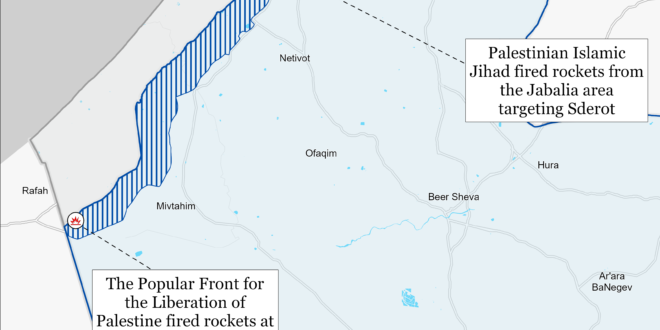Israeli forces expanded clearing operations on May 14 into areas of Jabalia refugee camp that the Israel Defense Forces (IDF) had not previously cleared. Two IDF brigades advanced into the center of the Jabalia refugee camp.[i] Israeli forces initially conducted clearing operations in Jabalia city and refugee camp in November 2023, but the IDF had not advanced into center of the camp before this operation.[ii]
Palestinian militias have sustained the highest number of claimed attacks per day around Jabalia since the war began. Palestinian militias have claimed 86 attacks (an average of roughly 28 attacks per day) targeting Israeli forces since the IDF advanced into eastern Jabalia on May 11.[iii] This rate of attack exceeds the level seen during a similar operation in Zaytoun, when the militias claimed 92 attacks (an average of roughly 10 attacks per day) over a nine-day period during the IDF’s first re-clearing operation in Zaytoun.[iv] The militias have preserved or rebuilt the personnel and material required to contest Israeli raids in the northern Gaza Strip. Hamas will likely be able to compensate for any losses it takes during this Israeli operation by rebuilding its units in the Jabalia refugee camp after the IDF withdraws, given the IDF’s clear-leave-repeat strategy.
Key Takeaways:
- Northern Gaza Strip: Palestinian militias are sustaining a very high daily rate of attacks targeting Israeli forces in Jabalia. The IDF is currently conducting two re-clearing operations in the northern Gaza Strip.
- Southern Gaza Strip: Israeli operations continued in eastern Rafah and around the Rafah border crossing.
- Iran: Iranian media identified former Iranian Ambassador to Iraq and IRGC Quds Force Brig. Gen. Eraj Masjedi as the IRGC Quds Force coordination deputy for the first time on May 14. The coordination deputy is the third highest-ranking officer in the IRGC Quds Force.
- West Bank: Israeli civilians set fire to two humanitarian aid trucks bound for the Gaza Strip at a checkpoint between Israel and the West Bank.
- Lebanon: Lebanese Hezbollah fired several anti-tank guided missiles targeting an Israeli surveillance balloon and equipment associated with it in successive attacks.
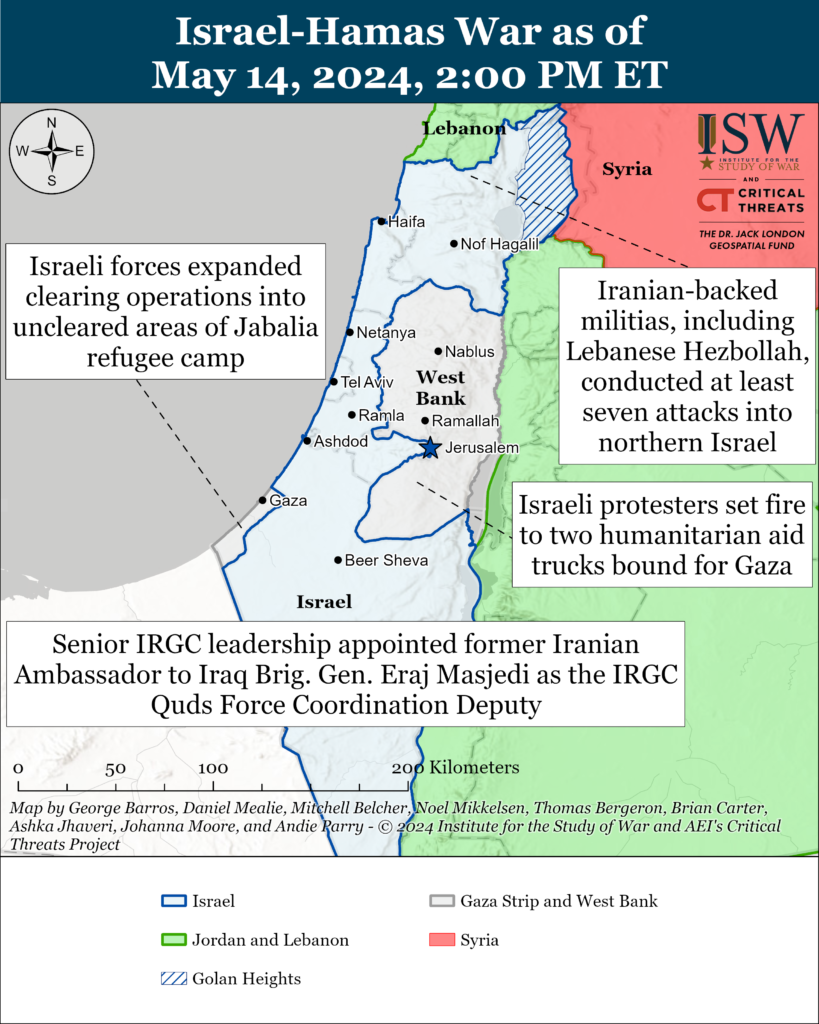
Gaza Strip
Axis of Resistance objectives:
Erode the will of the Israeli political establishment and public to sustain clearing operations in the Gaza Strip
Reestablish Hamas as the governing authority in the Gaza Strip
Israeli forces continued a re-clearing operation in Zaytoun, southern Gaza City, on May 14. Two IDF brigades located and destroyed military infrastructure, including rocket launchers and a weapons depot.[v] Tanks in the IDF 679th Armored Brigade killed several Palestinian fighters who were approaching Israeli ground forces.[vi] Three Palestinian militias separately engaged Israeli forces in Zaytoun.[vii]
The IDF issued evacuation orders for civilians in areas west of Jabalia in the northern Gaza Strip on May 14.[viii] The IDF said that it would operate in Atatra, an area west of Jabalia, to clear Palestinian militias operating in and launching rockets from the area. Israeli forces initially conducted clearing operations in Atatra in November 2023.[ix] The IDF issued evacuation orders on May 11 that covered areas of Jabalia refugee camp and eastern Jabalia.[x]
The IDF Air Force struck a Hamas operations room inside a UN Relief and Works Agency for Palestinian Refugees (UNRWA) school in Nuseirat, central Gaza Strip, on May 14.[xi] The IDF said that Palestinian fighters, including Hamas ‘Nukhba fighters, recently used the room to coordinate attacks targeting Israeli forces in the area. A UNRWA official said that the agency is not able to confirm the IDF’s report.[xii] The IDF said that the attack killed about 15 Palestinian fighters, including 10 Hamas fighters.[xiii] Local Palestinians reported that airstrikes in the area killed a total of 40 people.[xiv] The United States and Israel have repeatedly said throughout the war that Hamas uses hospitals and schools and other civilian facilities for military purposes.[xv]
The IDF 162nd Division continued its clearing operation in eastern Rafah and near the Rafah border crossing with Egypt on May 14. The IDF Givati Brigade located weapons, killed Palestinian fighters, and directed Israeli airstrikes in eastern Rafah.[xvi] The IDF 401st Armored Brigade engaged several Palestinian cells near the Rafah border crossing.[xvii] Local Palestinians reported that Israeli forces are operating in several neighborhoods west of the Salah al Din Road in eastern Rafah.[xviii] Several Palestinian militias rigged tunnels to explode to target Israeli forces and attacked Israeli forces in Rafah with small arms, improvised explosive devices, and mortars[xix]
Two unspecified senior Biden administration officials told CNN that the Biden administration assesses that Israel has amassed enough forces on the edge of Rafah city to conduct a full-scale military operation in the “coming days.”[xx] Senior US officials are unsure if Israel has made the final decision to conduct such an operation. US President Joe Biden warned Israel on May 8 that the United States would withhold additional arms shipments if Israel proceeded with a major operation.[xxi]
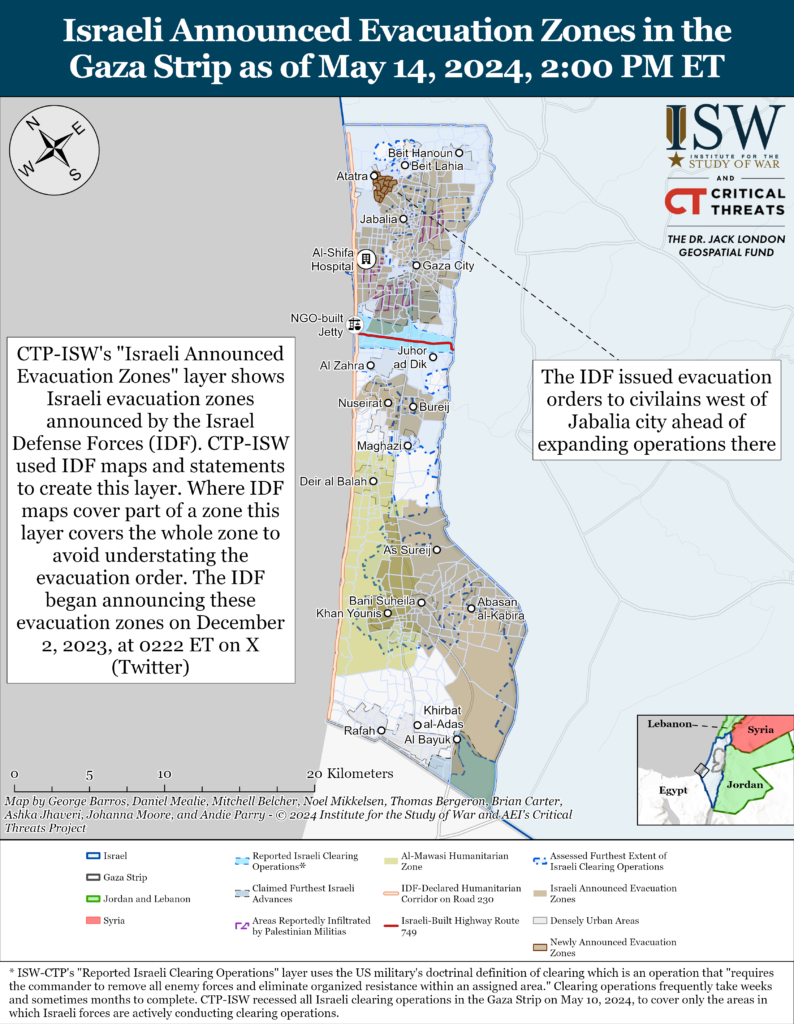
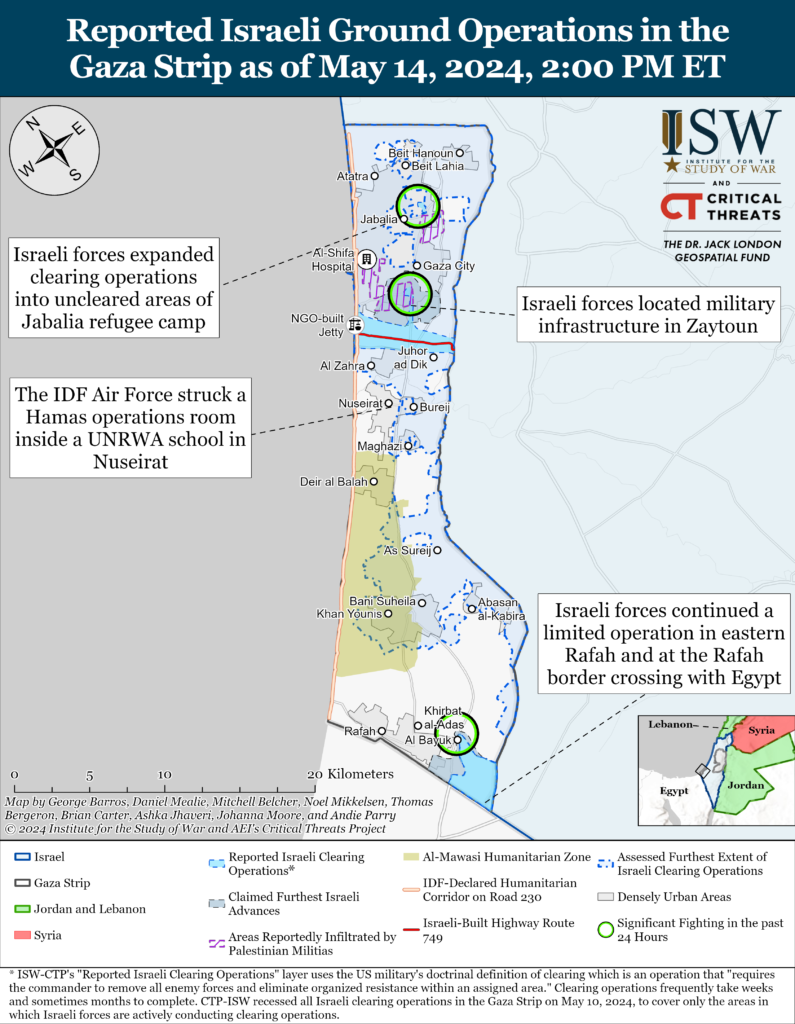
The Qatari prime minister said on May 12 that ceasefire negotiations between Israel and Hamas “are almost at a stalemate.”[xxii] He claimed that Israeli operations in Rafah have delayed talks. Hamas contributed to the standstill in negotiations when it introduced a ceasefire counterproposal on May 6 with two key changes that Israel had not accepted.[xxiii]
ADD NOTE
TWEET
US National Security Advisor Jake Sullivan said on May 13 that the world must demand Hamas to return to the negotiating table with Israel.[xxiv] Hamas claimed in a rebuttal to Sullivan’s statement that it has not neglected any round of negotiations and that it agreed to the latest proposal.[xxv] Hamas introduced a counterproposal, ”accepted” its own counterproposal, then framed the counterproposal as if Hamas had accepted the original agreement.
Sullivan said that military pressure is necessary but not sufficient to fully defeat Hamas.[xxvi] He warned that Hamas will return to power without a viable political plan for the Gaza Strip. Sullivan said Hamas has already returned in Gaza City. Hamas has begun reasserting its political power in the northern Gaza Strip by suppressing opposition, policing, and governing trade.[xxvii] Other US officials have similarly expressed concern that Hamas will survive in the Gaza Strip. Blinken warned on May 12 that without an alternative to Hamas, Israel will achieve tactical successes but ultimately Hamas would return to power.[xxviii] US Deputy Secretary of State Kurt Campbell told CNN that the United States doesn’t believe that Israel’s goal of a total victory over Hamas is ”likely or possible.”[xxix]
Unspecified people fired at a United Nations vehicle in Rafah on May 13, killing a UN employee and injuring another.[xxx] The UN said that the vehicle was clearly marked and that Israeli forces were aware of the car’s route to a hospital in Khan Younis.[xxxi] The IDF said that the two workers were hit in an active combat zone but the IDF did not specify who was responsible for the fire.[xxxii] The IDF also said that it was not aware of the vehicle’s movement.[xxxiii] The UN has opened a fact-finding panel to investigate the attack.[xxxiv]
Turkish President Recep Tayyip Erdogan said on May 13 that more than 1,000 Hamas members were being treated in hospitals across Turkey.[xxxv] An anonymous Turkish official told Reuters that Erdogan “misspoke” and meant to say that Turkish hospitals are treating Gazans.[xxxvi] The Turkish government announced plans in November 2023 to evacuate some wounded or sick Gazans, Turkish nationals, and Turkish Cypriots from the Gaza Strip to Turkey.[xxxvii] Turkey reportedly used the Al Arish International Airport in Egypt to transfer the Gazans to Turkey.[xxxviii]
Palestinian militias conducted four indirect fire attacks from the Gaza Strip into Israel on May 14.[xxxix] Palestinian Islamic Jihad (PIJ) fired rockets from the northern Gaza Strip targeting Sderot.[xl]
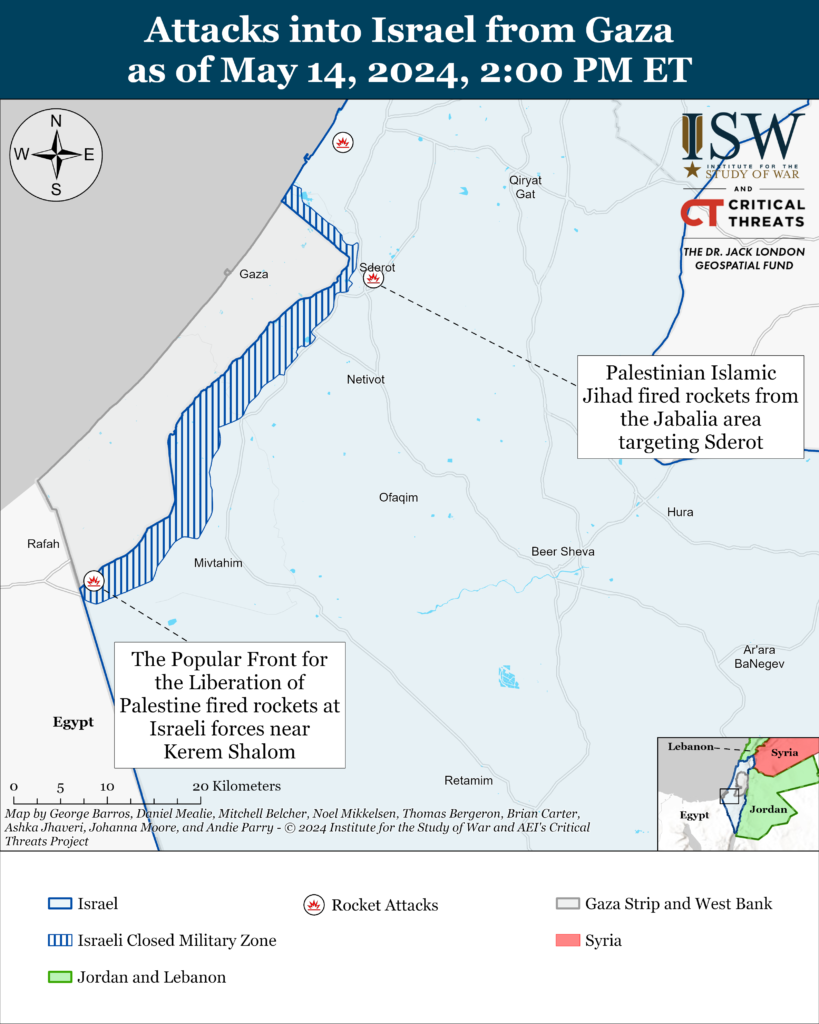
Recorded reports of attacks; CTP-ISW cannot independently verify impact.
West Bank
Axis of Resistance objectives:
Establish the West Bank as a viable front against Israel
Israeli forces have engaged Palestinian fighters in at least two locations in the West Bank since CTP-ISW’s data cut off on May 13.[xli]
Palestinians organized demonstrations on May 14 in Jenin, Ramallah, and Tulkarm to protest the treatment of Palestinians in Israeli prisons.[xlii]
Israeli civilians set fire to two humanitarian aid trucks bound for the Gaza Strip at a checkpoint between Israel and the West Bank on May 13.[xliii] CTP-ISW reported on May 13 that the Israeli Tsav 9 group—a right-wing activist group that seeks to disrupt the delivery of aid into the Gaza Strip as long as Hamas and its militia allies continue to hold Israeli hostages—organized protests to block a humanitarian aid convoy west of Hebron.[xliv] Israeli media reported that right-wing protesters returned to the site after Israeli police departed and set fire to two aid trucks from the convoy that the protesters had been blocking.[xlv] US National Security Advisor Jake Sullivan called the assaults on the aid convoy “utterly unacceptable behavior” on May 14. Sullivan said that the United States raised concerns with the Israeli government and that the United States is considering a response to the incident.[xlvi]
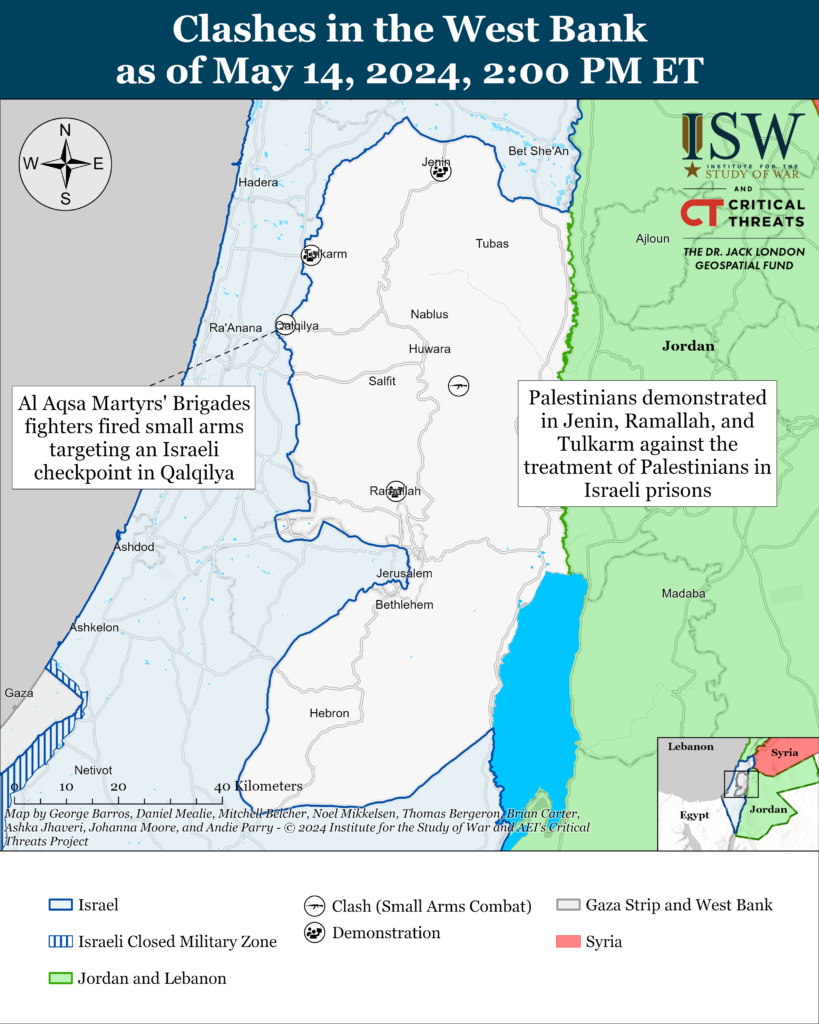
This map is not an exhaustive depiction of clashes and demonstrations in the West Bank.
Southern Lebanon and Golan Heights
Axis of Resistance objectives:
Deter Israel from conducting a ground operation into Lebanon
Prepare for an expanded and protracted conflict with Israel in the near term
Expel the United States from Syria
Iranian-backed militias, including Lebanese Hezbollah, have conducted at least seven attacks into northern Israel since CTP-ISW’s last data cutoff on May 13.[xlvii] Hezbollah fired anti-tank missiles targeting an Israeli surveillance balloon and equipment associated with the balloon near Adamit on May 14.[xlviii] The IDF said that the attack shot down the balloon and wounded five IDF soldiers.[xlix]
Israeli demonstrators blocked roads in northern Israel on May 14 to protest the Israeli government’s inability to return displaced Israeli civilians to northern Israel.[l] Regional officials in northern Israel announced plans on May 10 for protests on Israel’s Independence Day on May 14.[li] Residents began planning protests after Israeli media reports on May 10 that Israeli Prime Minister Benjamin Netanyahu had dismissed concerns during a cabinet meeting that civilians may not be able to return to northern Israel before the start of the school year in early September.[lii]
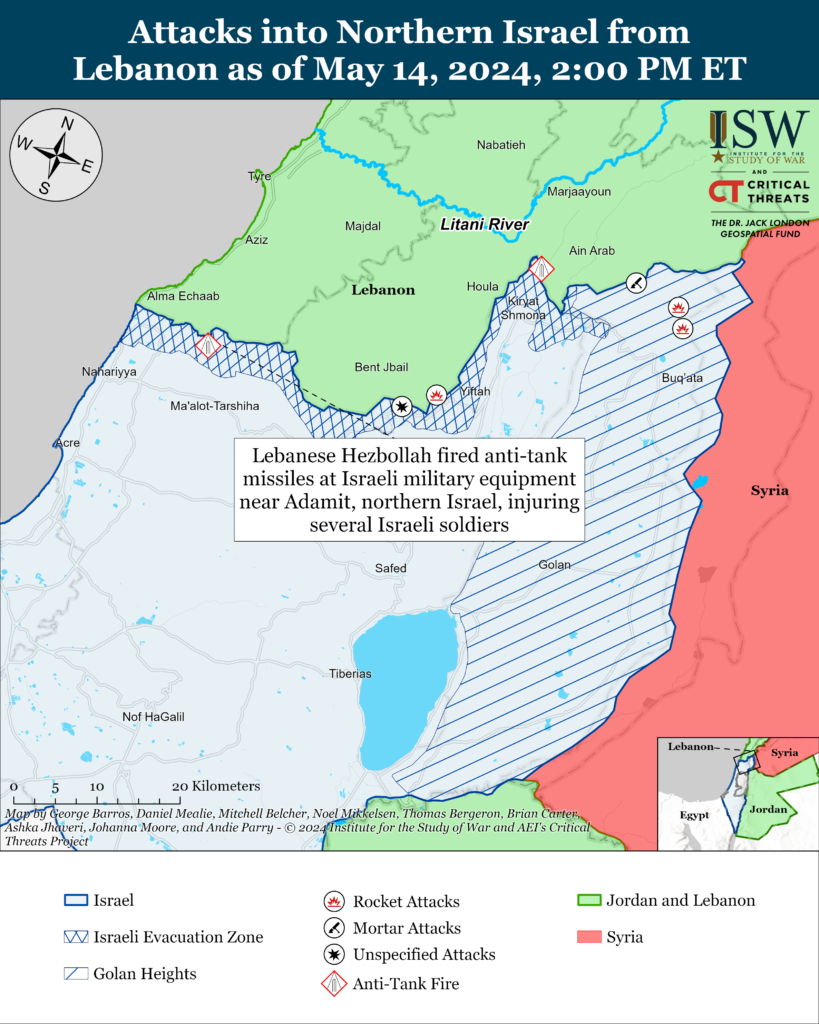
Recorded reports of attacks; CTP-ISW cannot independently verify impact.
Iran and Axis of Resistance
Supreme Leader Ali Khamenei greeted a Houthi delegation attending the Tehran International Book Fair on May 13.[liii] Khamenei asked the Houthi delegation to extend his “warm greetings” to Houthi movement leader Abdul Malik al Houthi. Houthi Ambassador to Iran Ibrahim al Daylami, Houthi Deputy Cultural Minister Mohammad Haidareh and Head of the Houthi Book Organization Abdulrahman Muard were part of the Houthi delegation.[liv]
Islamic Revolutionary Guard Corps (IRGC) Quds Force Coordination Deputy Brig. Gen. Eraj Masjedi said on May 14 that Iran’s enmity with Israel will not end until Israel is completely destroyed.[lv] Masjedi claimed that Iran can fight Israel and the United States simultaneously. Masjedi stated that it is difficult to use the element of surprise when conducting a direct attack on Israel due to the distance between the two countries.
Iranian media first identified Masjedi as the IRGC Quds Force coordination deputy on May 14.[lvi] The IRGC Quds Force coordination deputy is the third most senior position within the IRGC Quds Force. Masjedi replaced the former IRGC Quds Force Coordination Deputy Brig. Gen. Mohammad-Hadi Haji-Rahimi who was killed in the April 1 Israeli airstrike in Damascus, Syria.[lvii] Masjedi served as the Iranian Ambassador to Iraq from 2017-2022. He was also an advisor to IRGC Quds Force Commander Qasem Soleimani.[lviii] Masjedi played a ”formative role” in the IRGC Quds Force’s Iraq policy during his time as the Iranian ambassador to Iraq, according to the US Treasury Department.[lix] Masjedi oversaw a program to train and support Iraqi militia groups and “directed” Iraqi groups that were responsible for attacks against US forces. The United States Department of the Treasury’s Office of Foreign Assets Control (OFAC) sanctioned Masjedi in October 2020. Masjedi’s predecessor as IRGC Quds Force coordination deputy, Rahimi, also functioned as the IRGC Quds Force commander for the Palestinian territories.[lx]
Iran and India signed a 10-year contract to allow India to develop and operate the Shahid Beheshti terminal at the Chabahar Port on May 13.[lxi] India will invest $370 million in the port as part of the contract.[lxii] India took over the port’s operations at the end of 2018.[lxiii] Iranian Foreign Affairs Minister Hossein Amir Abdollahian stated that Iran is ready to increase cooperation with India via BRICS and the Shanghai Cooperation Organization (SCO) during a meeting with Indian Ports, Shipping, and Waterways Minister Sarbananda Sonowal on May 14.[lxiv]
US State Department Deputy Spokesperson Vedant Patel warned India that conducting business with Iran may expose India to pre-existing US sanctions.[lxv] US sanctions on Iran have deterred foreign investment in the Chabahar Port in the past.[lxvi]
The Islamic Resistance in Iraq—a coalition of Iranian-backed Iraqi militias—claimed on May 13 that it conducted an attack targeting an unspecified “vital target” in Eilat using two “Arfad” drones.[lxvii] The IDF reported on May 13 that its fighter jets intercepted an unmanned aircraft that approached Israeli airspace from the east.[lxviii] This attack marked the first time the Islamic Resistance in Iraq has claimed an attack using Arfad drones since the Israel-Hamas War began in October 2023. The Arfad drone bears visual resemblance to the Houthi Samad drone system. The Samad-3 has a range of around 1,500 kilometers. CTP-ISW cannot confirm if the Arfad is a Samad-3 or an earlier model. Iranian-backed Bahraini militia Saraya al Ashtar also used a drone resembling the Houthi Samad drones in an attack targeting Eilat on May 2.[lxix]
Faylaq al Waad al Sadiq Secretary General Mohammad al Tamimi said on May 9 that Iranian-backed Iraqi militias will resume attacks targeting US forces if US forces do not leave Iraq voluntarily.[lxx] Tamimi made this statement in an interview with Russian state-controlled media. Tamimi claimed that the United States has shown no intention of removing its forces from Iraq. Tamimi previously stated that the United States “only understands the language of force” during an interview with Russian state-controlled media in early April 2024.[lxxi] Tamimi separately claimed in his interview on May 9 that the Islamic Resistance in Iraq will continue to attack Israel until Israel ends its operations targeting Palestinian militias in the Gaza Strip.[lxxii] Faylaq al Waad al Sadiq reportedly has ties to Iranian-backed Iraqi militias Asaib Ahl al Haq and Harakat Hezbollah al Nujaba.[lxxiii] Iranian-backed Iraqi militias have not resumed their attack campaign targeting US forces since they suspended the campaign in late January 2024.
US CENTCOM intercepted one Houthi drone and one Houthi anti-ship ballistic missile over the Red Sea on May 13.[lxxiv] CENTCOM also conducted a preemptive strike targeting a drone in Houthi-controlled territory in Yemen. CENTCOM reported that the attacks posed an immediate threat to US, coalition forces, and merchant vessels in the area.[lxxv]
 Eurasia Press & News
Eurasia Press & News
